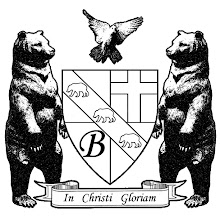I finished reading G. K. Chesterton's book Orthodoxy today. I thought it was a great book, and one that will bear repeat readings in years to come. Chesterton is a big-picture thinker. He is sometimes given to over-generalization, but more often than not, his insights ring true. One of Chesterton's great gifts is his ability to take the assumptions and beliefs of the modern world and turn them on their heads, usually by their own logic. His reasoning is utterly rational, his sense completely common.
Anyway, I found the conclusion of Orthodoxy particularly interesting, so I've included it below. I'd heard people remark before about the phenomenon Chesterton here considers, but I'd never heard such an intriguing and appealing explanation for it proposed. Anyway, here it is:
"Joy, which was the small publicity of the pagan, is the gigantic secret of the Christian. And as I close this chaotic volume I open again the strange small book from which all Christianity came; and I am again haunted by a kind of confirmation. The tremendous figure which fills the Gospels towers in this respect, as in every other, above all the thinkers who ever thought themselves tall. His pathos was natural, almost casual. The Stoics, ancient and modern, were proud of concealing their tears. He never concealed His tears; He showed them plainly on His open face at any daily sight, such as the far sight of His native city. Yet He concealed something. Solemn supermen and imperial diplomatists are proud of restraining their anger. He never restrained His anger. He flung furniture down the front steps of the Temple, and asked men how they expected to escape the damnation of Hell. Yet He restrained something. I say it with reverence; there was in that shattering personality a thread that must be called shyness. There was something that He hid from all men when He went up a mountain to pray. There was something that He covered constantly by abrupt silence or impetuous isolation. There was some one thing that was too great for God to show us when He walked upon our earth; and I have sometimes fancied that it was His mirth."
Subscribe to:
Post Comments (Atom)


No comments:
Post a Comment